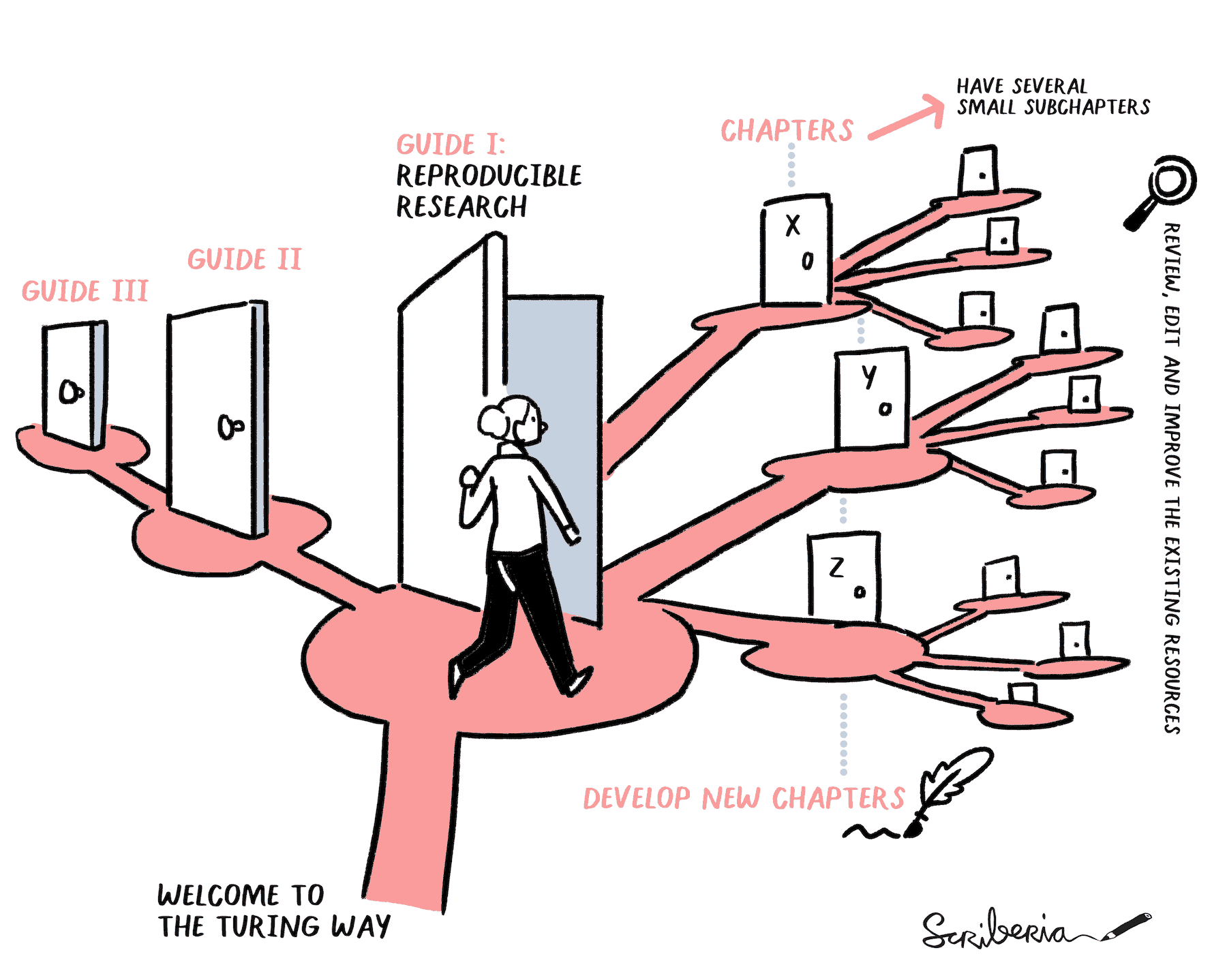Navigating the Handbook#
The Turing Way handbook is organised in different guides on data science practices and additional sections to cover different aspects of the project.
Each section contains multiple chapters, and each chapters are divided into smaller, self-contained sub-chapters to allow you to navigate the book and its content easily in your own pace.
The Turing Way Guides#
All community-developed resources on research and data science practices are organised into five guides and a handbook. The book started with a guide on research reproducibility, that contains tools, methods and practices from computational aspects of data science. Other guides contain different socio-technical aspects that should be considered to make data science open, collaborative and ethical, and hence, ultimately enhancing the reproducibility of a project.

Fig. 4 The Turing Way project illustration by Scriberia. Original version on Zenodo. http://doi.org/10.5281/zenodo.3695300.#
The decision to integrate different chapters into specific guides is collectively made by community members through open discussions via GitHub issues and Slack. However, their positions within the book are simply for organisation and access purposes; the guide itself doesn’t limit the scope of the chapters and hence can be edited and updated by anyone (including you!) at any time with relevant information.
Reminder
The Turing Way is not meant to be read from beginning to end!
Foreword and Afterword#
We have also developed foreword and afterword to share contexts, backgrounds and supplementary resources from and about The Turing Way.
Browse the different guides and sections that make up the book, or use the search box to search for whatever you would like to learn about first.
Areas of Work and Scope#
The Turing Way is continually evolving to meet the needs and interests of the community across following areas of work.
Engage diverse stakeholders in The Turing Way through open, inclusive and collaborative efforts, fostering a community that collectively shapes research and scientific discourse in data science and AI.
Co-create, maintain, and sustain an open-source, community-driven handbook on data science, providing tools, practices and real-world examples of open and reproducible research.
Advocate for responsible and ethical practices, promoting transparency, fostering accountability and embedding human rights principles throughout the lifecycle of research, data science and AI projects.
Champion best practices in communication, collaboration, and project design as fundamental pillars for making data science and AI accessible, comprehensible, and beneficial for all stakeholders.
Scope of The Turing Way#
The scope of The Turing Way can be broadly described across six areas of work, with practices and resources shared openly in the handbook:
The Turing Way Book: Disseminating best practices, examples, and recommendations openly in chapters covering reproducible research, communication, collaboration, project design, ethics, and community.
The Turing Way Community: Fostering a diverse and international community, encouraging contributions, building upon existing knowledge, and collaboratively advancing best practices in data science.
Open Leadership: Promoting open leadership by providing community infrastructure, processes, and resources for individuals from diverse backgrounds and interests to lead and connect a decentralised network of actors and their efforts.
Domain Expertise: Collaborating with representatives and experts who contextualise and share The Turing Way resources in their respective domains.
Project Partnership: Proactively partnering with organisations and projects aligned with our vision and mission, combining knowledge, expertise, and resources for the shared benefits of our communities.
Global Impact: Extending the impact of The Turing Way by conducting global outreach, engaging with different sectors, supporting the localisation of resources, advocating for policy changes and facilitating cross-community efforts
Get Involved: If you have ideas and plans for The Turing Way, please reach out to The Turing Way team via email at turingway@turing.ac.uk. Your input is valuable to the ongoing development of the project.